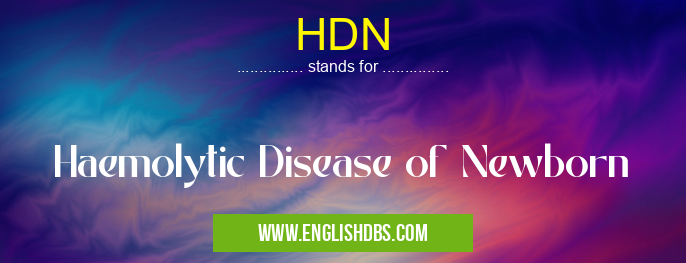What does HDN mean in PHYSIOLOGY
Haemolytic Disease of the Newborn (HDN) is a condition that occurs when an infant's red blood cells are destroyed prematurely, resulting in health problems for the baby. It is caused by incompatibilities between the mother's and baby's blood types. HDN is most common in babies whose mothers have Rh-negative blood type and fathers with Rh-positive blood type.

HDN meaning in Physiology in Medical
HDN mostly used in an acronym Physiology in Category Medical that means Haemolytic Disease of Newborn
Shorthand: HDN,
Full Form: Haemolytic Disease of Newborn
For more information of "Haemolytic Disease of Newborn", see the section below.
» Medical » Physiology
Essential Questions and Answers on Haemolytic Disease of Newborn in "MEDICAL»PHYSIOLOGY"
What are the symptoms of Haemolytic Disease of Newborn?
Symptoms of HDN may include jaundice (yellowing skin and eyes), pale skin, poor feeding, fatigue, breathing difficulties, and irritability. In severe cases, it can lead to anemia, enlarged liver or spleen, heart failure, kidney failure, brain damage or death.
How is Haemolytic Disease of Newborn diagnosed?
The doctor will ask about family history and birth history as well as perform a physical exam on the baby to look for signs of HDN. The doctor may also order a blood test to check the levels of hemoglobin in the baby's bloodstream.
What treatments are available for Haemolytic Disease of Newborn?
Treatment will vary depending on the severity of the condition but usually involves providing fluids and other medications to help stabilize the baby's condition until their immune system can handle it without further complications. Phototherapy may also be used to reduce jaundice levels in babies with HDN. In some cases, an exchange transfusion may be necessary to replace destroyed red blood cells with healthy ones from another person's blood supply.
Final Words:
HDN can be a serious condition for newborns if not detected and treated early on. It is important for parents to be aware of potential incompatibilities between their own blood types and those of their child in order to recognize signs and symptoms early on should they occur so that medical attention can be sought quickly should any presenting issue arise during or after delivery.
